Evidence
1/45
There's no tags or description
Looks like no tags are added yet.
Name | Mastery | Learn | Test | Matching | Spaced | Call with Kai |
|---|
No analytics yet
Send a link to your students to track their progress
46 Terms
At what point in proceedings will the parties bring forth evidence in support?
Outlined cases in statements of case.
Parties then use evidence to prove / disprove the issues raised.
How may a court control evidence through giving of directions?
Issues on which it requires evidence (liability, causation, quantum)
Nature of evidence (i.e. expert’s report)
Number of witnesses of fact a party can call;
Way in which evidence placed before court (oral / written).
What is the overriding principle that governs the court’s control of evidence?
Decided matters justly and at proportionate cost.
May include / exclude evidence up to and including trial.
R 1.1, CPR.
What is the general rule on the legal burden of proof within civil proceedings?
BOP lies upon claimant.
Prove each fact unless opponent admits it.
Example - Breach of contract. Prove contract exists, express / implied term breached, CL suffered loss.
Is there an exception to the general rule that the CL bears the burden of proof in civil proceedings?
S. 11, Civil Evidence Act 1968
D convicted of criminal offence.
BOP reversed.
If D argues should not have been convicted? Must prove this.
Example - John (CL) and Mary (D) in civil proceedings for RTA. M hit J’s car while stationary at roundabout. M convicted careless driving at MC. J cites details of conviction in particulars of claim. Makes connection to M’s negligent driving. If M argues wrongly convicted then must prove this to Court.
***NOTE - Reverses the BOP from the very START of the case.
CL brings claim and D must prove on balance of probabilities that it is incorrect. See example.
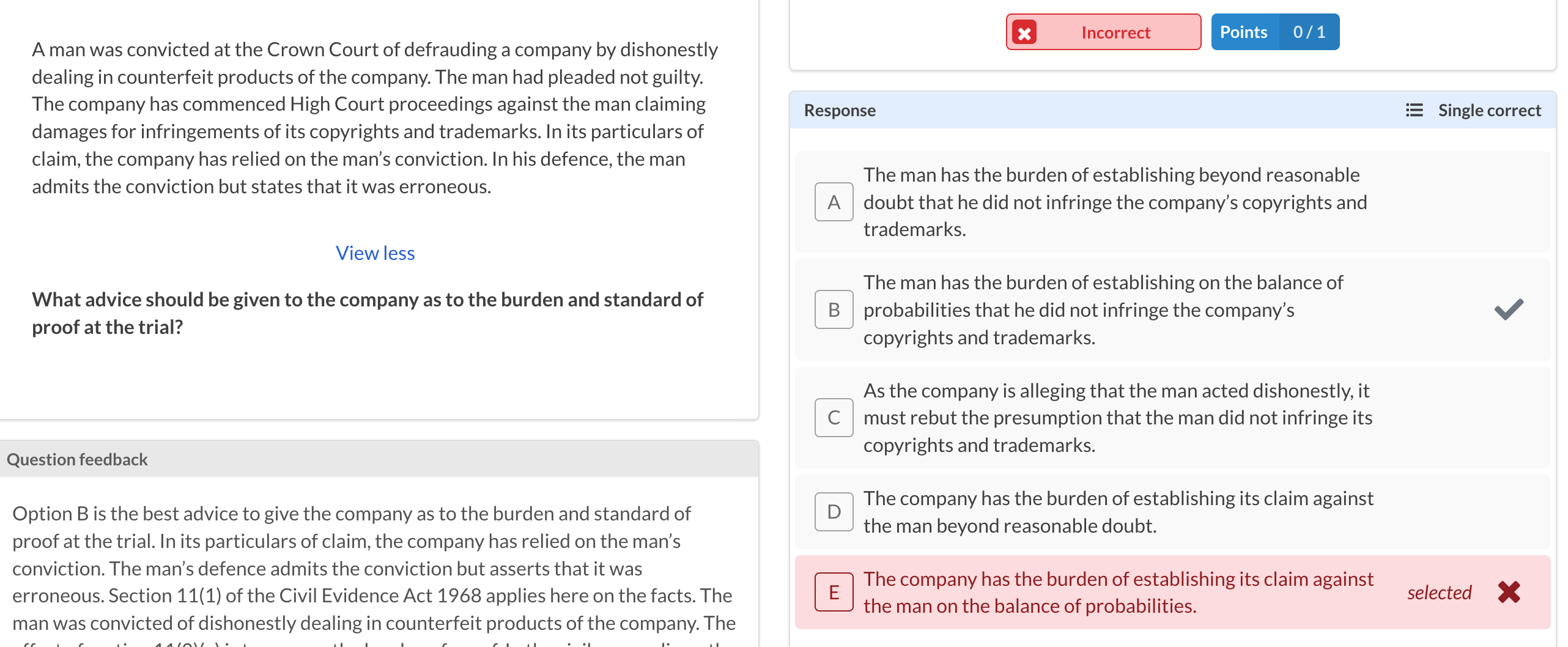
Aside from s. 11, Civil Evidence Act 1968 what other occasion does the legal BOP rest upon the D?
D claims contributory negligence on CL’s behalf.
What does the ‘balance of probabilities’ mean?
Judge persuaded that CL’s version more likely to be true than D’s.
Certainty of >50%.
What must a party do if they wish to call a witness?
Part 32, CPR.
Serve witness statement on other parties.
Set out facts witness give orally at trial.
If not served - Witness only speak at trial with court’s permission.
If a witness statement cannot be obtained, what can the party do?
Apply for court order without notice for ‘written witness summary’.
Contains:
Witness’s name + address
Evidence witness can provide;
Matters witness would be questioned at trial (i.e. relevant disputed issues).
Not as good as witness statements. But better than nothing.
What are the formalities for a written witness statement?
Headed with title of proceedings, witness name, number of statement, date in corner.
Opening paragraph: Witness’ address, occupation, whether part of employment or business.
Numbered paragraphs. Numbers / dates as figures not words (i.e. 5 not five).
Dates expressed as ‘16 January 2024’ not ‘16.01.2024’.
Follow chronological series of events.
Set out what witness would say at court (if oral evidence).
Written in 1st person; expressed own words.
State information from own knowledge or on information / belief. Note how statement made (i.e. face-to-face, telephone).
Formally exhibit attached documents (i.e. AP1).
Verified by statement of truth.
True or False: A witness statement’s statement of truth cannot be signed by a legal representative.
True.
Must be signed by themselves.
‘I believe that the facts stated in this witness statement are true. I understand that proceedings for contempt of court may be brought against anyone who makes, or causes to be made, a false statement in a document verified by a statement of truth without an honest belief in its truth’.
When are witness statements typically exchanged between the parties?
Case allocated to track; court then gives directions on exchange.
Exchanged simultaneously; few weeks after disclosure / inspection documents.
Opportunity for witness to review evidence upon seeing documents.
After serving a witness statement on the other party, what then occurs at the trial?
Judge read all statements; compiled in trial bundle.
Witness enter box, take oath, shown copy of statement and confirm truth.
Opponent’s advocate questions via cross-examination.
Is it possible to mention further details outside the witness statement at trial?
No.
Require court’s permission; good reason why evidence not within original statement.
Exception not rule. Witness statement must be comprehensive.
What are affidavits? When are they used?
Sworn statements of evidence.
Affirm before solicitor (not your own) or authorised person evidence is true.
Used for freezing injunctions, search orders.
Rare. Replaced by witness statements.
What are the main rules of evidence governing witness statements and affidavits?
Relevance
Opinion
Hearsay
What is meant by the rule that evidence be ‘relevant’?
Must address relevant facts.
Those that are in dispute and must be proved by the party calling the witness.
Compare particulars of claim; facts not admitted and denied are disputed.
What is the general rule on opinion evidence?
Inadmissible.
Exceeds witness function to give evidence relevant facts.
Court draws its own conclusions.
Is there an exception to the rule that opinion evidence is not admissible?
S. 3(2), Civil Evidence Act 1972
Yes.
Give opinion if way to convey facts personally perceived.
List facts they saw which lead to conclusion.
But cannot draw conclusion from evidence.
Example - Witness to RTA; ‘in my opinion that D’s speed was excessive and too fast in the circumstances.
Draws a conclusion. Not allowed.
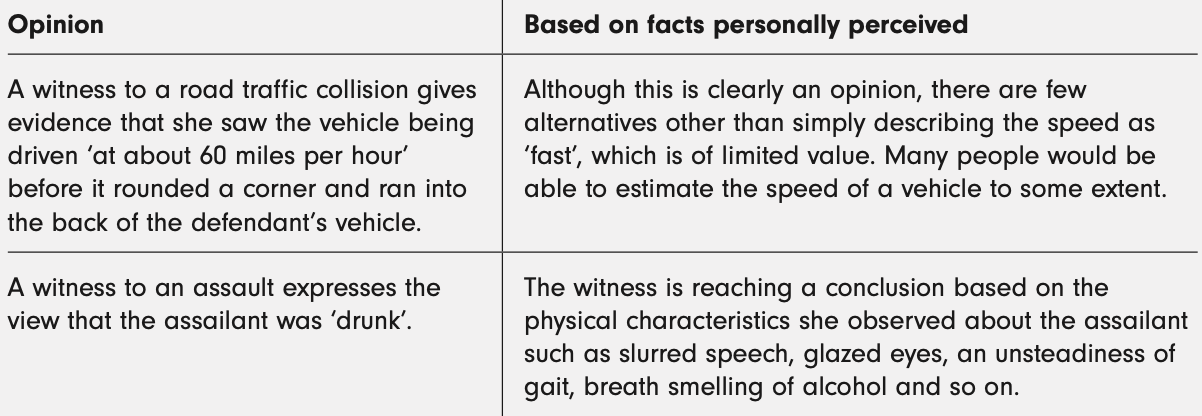
True or False: Expert evidence is an exception to the general prohibition on opinion evidence.
True.
Permitted to express opinion.
What is the definition of hearsay under s. 1(2), Civil Evidence Act 1995?
Statement made outside court;
Repeated in court;
To prove truth of matter stated.
Statement = Relevant fact or admissible opinion.
Can be oral or written (i.e. witness statement or oral evidence).
KEY ASPECT = Reason is to prove truth of words said (i.e. purpose).
Judge asked to rely on this to reach decision.
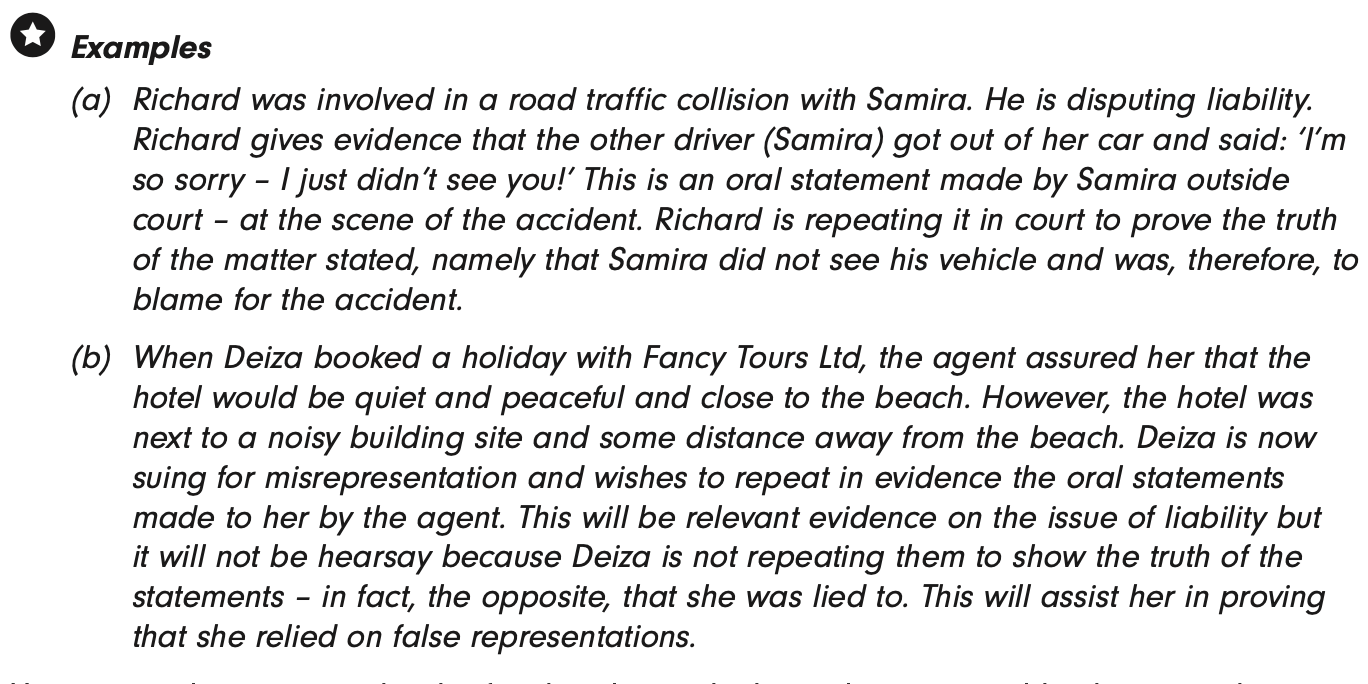

Examples of firsthand and multiple hearsay evidence
What is the procedure to admit hearsay evidence?
S. 1(1), Civil Evidence Act 1995
Party intends to call witness whose statement contains hearsay. Serve other party with statement.
Opponent can then request court order that witness be available cross-examination or serve notice of intention to attack credibility hearsay evidence.
Witness not called to give oral evidence; whole statement becomes hearsay. Opponent cannot cross examine. Only given advance warning.
If a witness statement contains hearsay and the witness is not being called to give oral evidence - what must the party relying on this evidence do?
Serve witness statement on opponent;
Inform them witness not being called for oral evidence;
Explain reasons why.
Do so via ‘Hearsay Notice’. Attached to statement.
REMEMBER - D can always apply to court to request witness attend for cross-examination or notice of intent to attack evidence credibility.
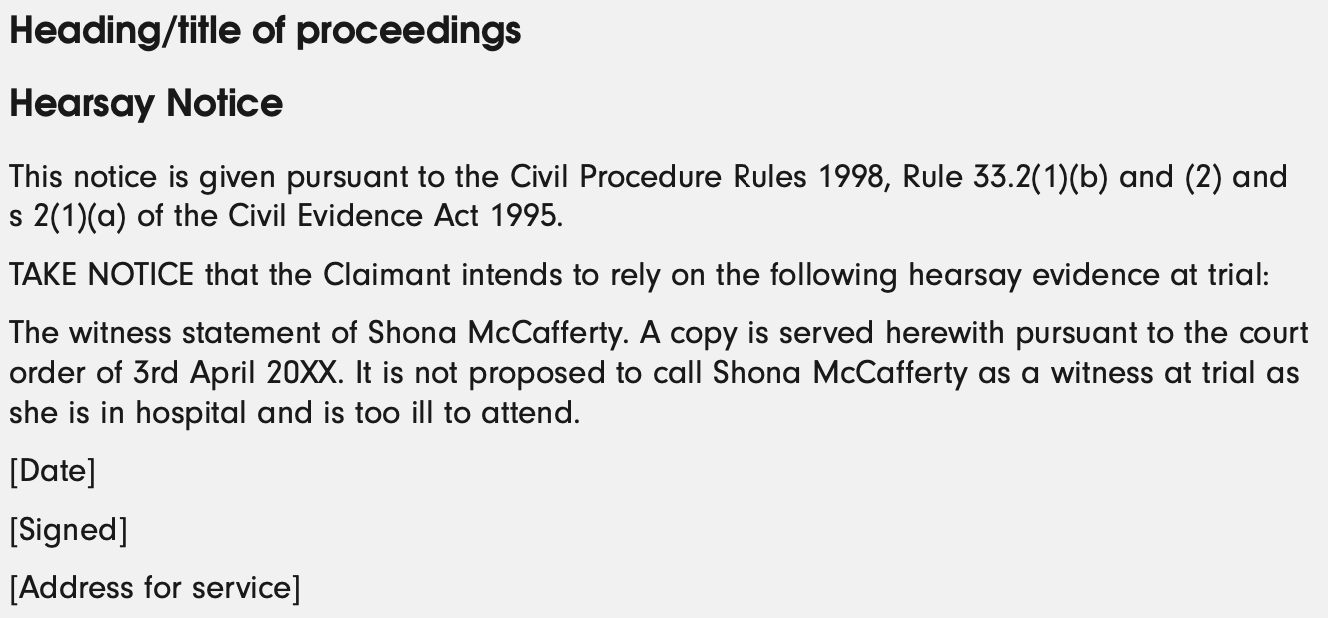
What is the effect if the party does not comply with the notice requirements?
Hearsay still admissible.
Failure to notify accounted for in assessing weight to be given or costs order.
Why is hearsay considered ‘second-best’ evidence?
Several reasons:
Out-of-court statements not made on oath.
People lie or exaggerate.
Repetition of statements increase likelihood error.
Cannot be cross-examined. Judge unable assess demeanour.
What questions does the judge pose when evaluating hearsay evidence?
(A). What issue does hearsay evidence address (if any)?
(B). How important is that issue?
(C ). What other evidence is available on same issue?
(D). Hearsay evidence more probative than any other evidence party could obtain via reasonable efforts?
Statutory safeguards on admissibility of hearsay evidence also exist under s. 4, Civil Evidence Act 1995.
What are those safeguards?
(A). Reasonable and practicable for party to have called maker of hearsay as witness? If no credible reason then not given weight.
(B). Statement made contemporaneously with events? Facts are fresh in memory (i.e. note of car reg at scene valid; not one 2-months later).
(C). Multiple hearsay. Cautious of misreading, exaggeration, general inaccuracy.
(D). Person had motive to conceal or misrepresent (i.e. employee please employer)
(E). Original statement edited? Or made in collaboration with someone else (i.e. collusion).
(F). Circumstances suggest attempt to prevent proper evaluation.
NOTE - Above are considerations relevant to whether or not to admit hearsay evidence.
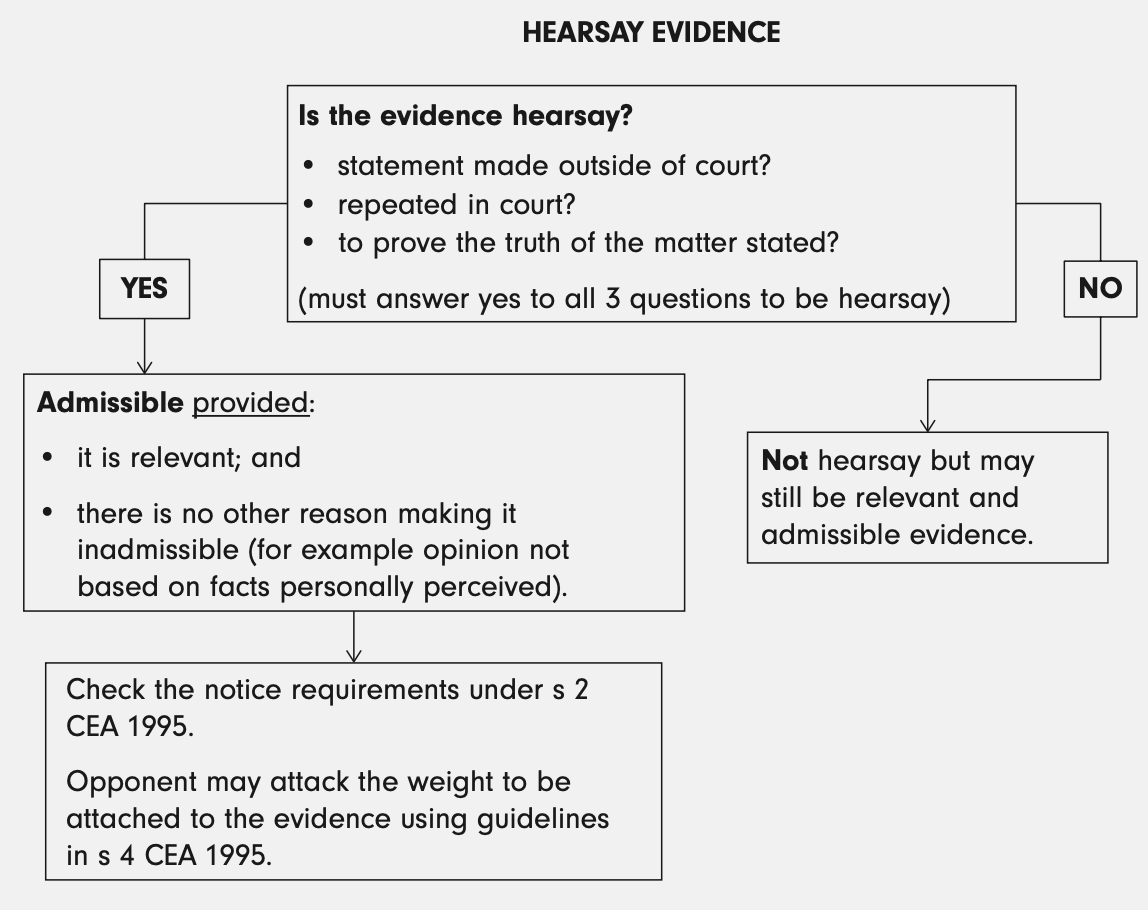
True or False: A party does not need permission to call an expert witness just as with ordinary witnesses.
False.
Require court permission to call expert witness.
Done so at directions stage.
Or at case management conference.
How may the Court limit the use of expert evidence?
Refuse to allow expert evidence.
Limit number or only for specific issues.
Direct parties agree experts.
Limit to written reports.
Court satisfied necessary to decide disputed issue.
Look at value of claim, proportionality, costs.
What is the nature of expert’s duty under Part 35?
Assist court by providing objective, unbiased opinions on matter within expertise.
Duty to court overrides obligation to instructing party.
Duty is not to assume advocate role.
NOTE - Duty to paying solicitor under Sale of Goods and Supply of Services Act 1982 exercise reasonable care / skill in producing report.
What is an SJE? What will the courts consider when deciding if one is appropriate?
‘Single Joint Expert’.
Is it proportionate to have separate experts for each party on particular issue?
Is an SJE likely to resolve issue speedily and in cost-effective way?
Likely to be range of expert opinion.
Parties can’t agree? Court picks unilaterally from parties’ list.
What must the parties show to the court to appoint their own expert in a fast-track case?
May be granted permission if parties show…
Proportionate to amount in dispute.
Importance to parties.
Complexity of issue (i.e. liability, quantum).
NOTE - Typical order is SJE in fast-track case.
How will an SJE work under the fast-track?
Typical order is appoint SJE unless good reason not to do so.
Done via written reports. Not oral evidence.
Reports submitted simultaneously. Costs shared.
What are some of the rules and limits on expert witnesses under the intermediate and multi-track?
Common to have separate experts.
Account for disputed amount, importance to parties, complexity of issues.
Intermediate track = Limited to 1 expert witness.
Allowed 2nd if reasonably required + proportionate.
Report <20 pages. Include photos, plans, academic articles.
Before separate experts are ordered, what further directions will the courts make to narrow down the issues?
Exchange - Deadline imposed for exchange reports.
Questions - Parties pose written questions to experts for clarification and proportionate (i.e. not endless questions). Be within 28 days. Answers provided form part of expert’s report. Other party pays costs of answering questions.
Discussion - Experts MAY hold without prejudice discussion. Other parties / counsel absent. Narrow down issues (i.e. agree / disagree, actions to resolve, further issues not raised).
Written joint statement - Experts provide report summarising discussion. Issues they agree / disagree. Sent to parties.
Oral evidence - Judge decides if oral evidence to be given. Common at multi-track for this.
Note these directions are a discretion of court.
Court does not need to do these things.
What are the formalities for expert evidence?
Addressed to court
Details of expert’s qualifications
Details of literature cited / relied on.
Statement setting out substance of facts / instructions.
Identify who carried out examination, measurements etc.
Range of opinions? Summarise. Give reasons for own opinion.
Summarise conclusions reached.
Statement that expert understands court duty. Complied with Part 35.
Must an expert report contain a verified statement of truth?
Yes.
What is the effect of a failure to comply with Part 35 on expert evidence?
Serious breach? Party barred from relying on expert.
But mostly judge account for breach when weighing up evidence.
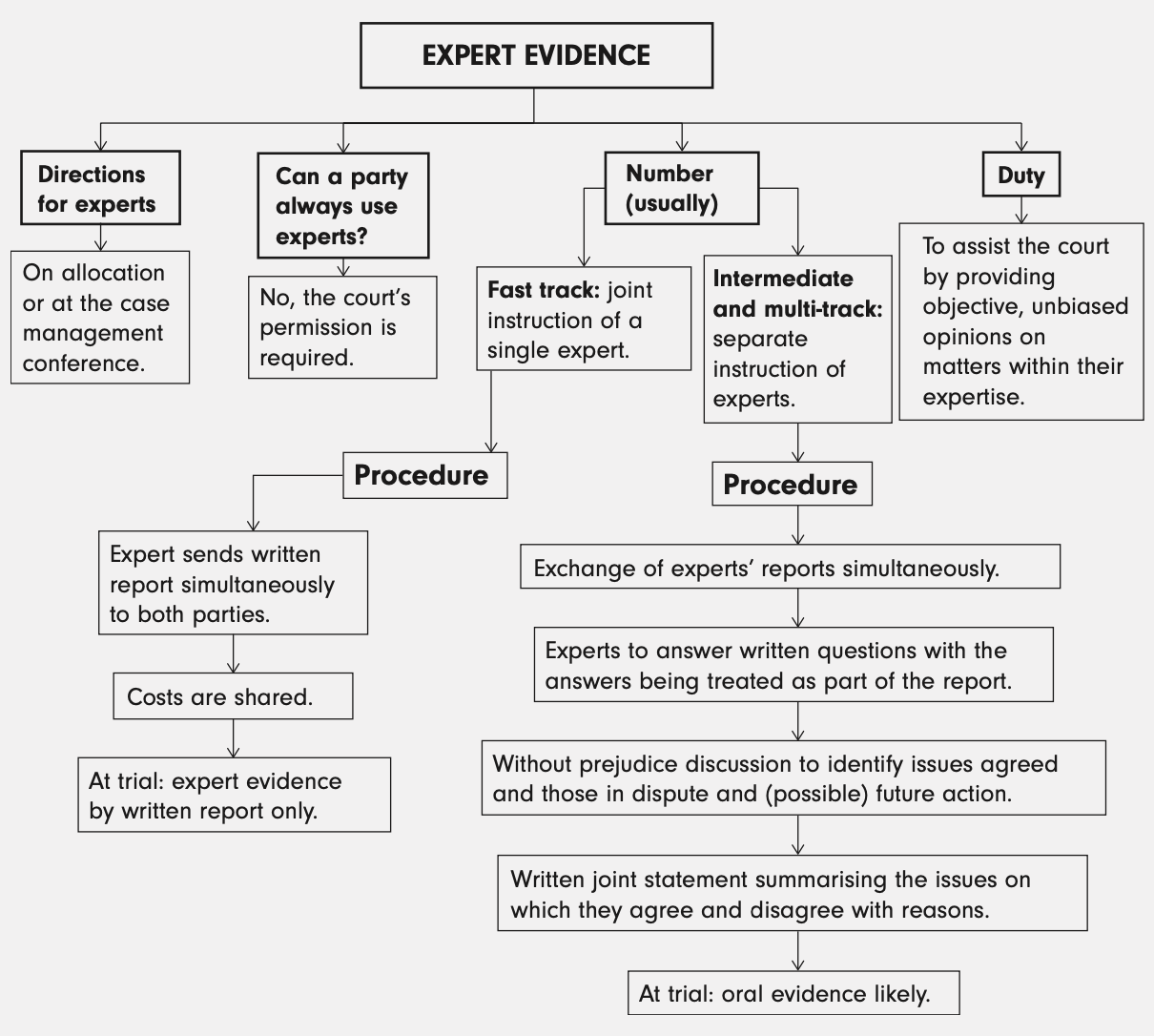
Are the solicitor’s initial instructions to the expert witness subject to legal privilege?
No - Rule 35.10
Court can scrutinise instructions if reasonable grounds consider them inaccurate / incomplete.
Must the expert when producing their reports disclose any potential conflict of interest (i.e. employment)?
What is the effect of disclosing this?
Yes.
Disclose any connection to parties in matter (including employment).
NOTE - Former employment is not an automatic disqualification. Court assess connection first. But would prefer an expert that is not a former employee.
Can the expert supply their opinion in a written statement?
No.
It must be an expert report.
A solicitor is reviewing the first draft of a witness statement for a client. The draft witness evidence contains the following statement, which the solicitor immediately notes as being relevant to one of the key issues in dispute:
‘When I asked my brother what had happened to the invoices, he said that he saw me lock them in the safety deposit box in my office, which is not true because the safety deposit box is broken.’
Is this hearsay?
No.
It is a statement made outside of court and repeated in court, but it is not used to prove something is true.
which is not true because the safety deposit box is broken.’
This is the offending phrase. Omit this and it would be admissible hearsay.
Why? Because then relying on the statement.
If an expert does not respond to the written questions of the other party after service - what are the consequences?
Court may order that:
Party cannot rely on the evidence of the expert; and / or
Order that the fees of that expert are not recoverable.
Must a solicitor disclose the substance of all material instructions to the expert in their report?
Yes.
Must disclose the substance of material instructions (i.e. written / oral).
This is not all instructions, but relevant ones.
Confidentiality only applies when being prepared.
True or False: An expert may be subject to cross-examination on their instructions just as any other witness.
False.
Require court permission to cross-examine instructions to expert.
Court must have reasonable grounds to believe inaccurate / incomplete.